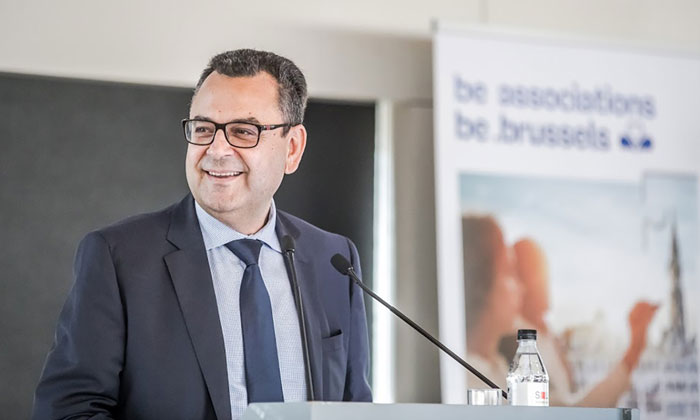Making 2018 the year of equality, digitalisation and new mobility
- Like
- Digg
- Del
- Tumblr
- VKontakte
- Buffer
- Love This
- Odnoklassniki
- Meneame
- Blogger
- Amazon
- Yahoo Mail
- Gmail
- AOL
- Newsvine
- HackerNews
- Evernote
- MySpace
- Mail.ru
- Viadeo
- Line
- Comments
- Yummly
- SMS
- Viber
- Telegram
- Subscribe
- Skype
- Facebook Messenger
- Kakao
- LiveJournal
- Yammer
- Edgar
- Fintel
- Mix
- Instapaper
- Copy Link
Posted: 28 February 2018 | Intelligent Transport | No comments yet
Secretary General of UITP, Mohamed Mezghani talks to Intelligent Transport about his plans for his first year in the position and how innovative digitalisation will continue to impact the transport industry…


What plans do you have in your first year as UITP Secretary General having taken over from Alain Flausch?
With Alain Flausch, we engaged in a deep reform of UITP offerings and membership benefits with the aim of strengthening the brand, growing the volume of membership, professionalising its services, developing expertise, advocating public transport and facilitating networking and business relations between members.
This reform has already led to very positive results for the association and its members as satisfaction surveys show that members notice and appreciate the changes. Moreover, growing figures related to membership development and audience of events confirm the qualitative assessment. The ongoing changes will be continued and strengthened, as their potential has not been fully exploited yet.
On the other hand, UITP must take into consideration the changing public transport context, and in particular the emergence of new mobility solutions and new players. In this regard, I would like to help our members be more agile and empowered to better address the challenges. I will be focusing on engaging with the whole market of public transport and shared mobility, developing high quality services with good value for money while making sure the association is financially sustainable, answering local specificities and the expectations of different member categories. This will happen by generating relevant and targeted knowledge and services, strengthening the advocacy of public transport and sustainable mobility.
What impact do you think UITP can have on the global public transport industry under your guidance?
We will emphasise the importance of focusing on people, be they travellers or employees. UITP will also promote gender balance amongst public transport employees and the many benefits it has for customer service and the industry’s image. The important issue of women’s safety in the system will also take a prominent place in our work. The definition of public transportation must become broader than just mass transit; we must embrace any kind of on-demand and shared mobility solutions. It should be understood as any modes accessible to the public, beyond the ideological and dogmatic positions of each category of market player. UITP aims to increase awareness about the contribution of public transport to improve cities and the wellbeing of citizens. Transport customers, and their ability to access amenities around them, are the focus and their expectations should lead the approach to the market’s development. The transport industry has the potential to offer this accessibility whilst improving quality of life and boosting economic development. Mobility is not a solution in itself.


Are there any specific industry developments or themes that you foresee defining 2018?
Digitalisation will be the main trend affecting our industry at different levels: in relation to the customer with the collection and exploitation of data, service operation through automation and maintenance such as predictive maintenance. Autonomous vehicles will continue to develop and we’ll see more driverless shared shuttles integrated within the network. We’ll also start seeing the first trials of applying blockchain technology in mobility services.
Changes will occur in the transport/mobility ecosystem with the strengthening of certain participants, while others will, inevitably, lose ground. This will mainly affect the players who have emerged recently and can see business opportunities but are still looking for the best strategic positioning.
Over the next 12 months, we’ll see more commitment and probably regulatory instruments to ensure women’s security in public transportation.
How long do you anticipate the current pace of innovation in public transport lasting? When it slows, how much of that innovation will actually be implemented into various aspects of public transport?
Innovation is taking place at different levels. Digitalisation has led to the development of software and applications in a very short period of time. Some start-ups have found their market, others have disappeared but may reappear later in a different form when the technology or the market is more mature. This dynamic will continue, but our industry needs to be agile enough to seize the opportunities offered by these innovations.
Innovation in ‘hardware’ takes longer to be deployed on a large scale because it requires demonstrations, trial periods and then industrialisation – and that’s without considering the time needed for implementation and the investment budget. Moreover, introducing a new technology into an existing network without interrupting service operation is challenging: think about the automation of conventional metro lines, or the deployment of a large fleet of electric buses.
Finally, but still an important issue, is the innovation in governance and business models, in particular considering the new players who are changing the mobility market and creating untraditional approaches and relationships with the customer and existing stakeholders. The rolling stock and systems industry is also willing to play a role that goes beyond supplying and to build long-term partnerships with public transport operators and authorities. These new approaches may require changes in regulations or governance systems that, in some countries, could challenge the status-quo.
Biography


Related topics
Mobility Services, Multimodality, Passenger Accessibility, Passenger Experience
Issue
Issue 1 2018
Related organisations
UITP
Related people
Mohamed Mezghani








